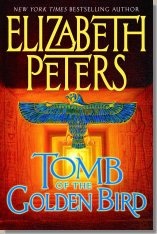
When I was a kid, I wanted to be many things when I grew up. And one of those was being an Egyptologist.
Now keep in mind, I had no idea what exactly an Egyptologist did and this goal, no doubt, came about because of many really bad movies in which crypts and mummies unleashed all sorts of havoc.
That career goal lasted only a little while and was folded into many other occupations that my childhood brain concocted.
But my interest in Egyptology has never stopped. Egypt was full of such interesting events—a boy who is named King Tut, the feral Cleopatra who is a mere teen when she began her rule, the legend that the Napoleon’s soldiers may have used the Great Sphinx of Giza for target practice.

I use that rather flippant antidote to pay homage to Elizabeth Peters aka Barbara Mertz who died last week, on Aug. 8 at age 85.
There have been many tributes and remembrances of Mertz on Facebook, on the various obituary sites and more. I wanted to add one for Mystery Scene but wasn’t sure how to approach it.
Until I remembered how personal each of our relationships is with an author. Each of us can identify with a plot, a character or even a setting because of how it affects each of us as individuals.
For me, and I suspect other fans, the novels written as Elizabeth Peters about daring Victorian archaeologist Amelia Peabody were what touched me.
She wrote some 19 novels about Amelia and her family that took us into the “Golden Age” of Egyptology with excavations the backdrop for the plots. I don’t pretend to have read more than half of these wonderful tales.
These novels were about possibilities. Of the idea that anything could be uncovered, linking our past with our future.

The novels began with Crocodile on the Sandbank, published in 1975, and took us into the crypts, the pyramids, the culture, the desert of Egypt. The novels start in the 1880s when Amelia decided to see the world as a wealthy feminist spinster.
Along the way she would acquire a loving husband and children. Amelia would be witness to some of the most astounding discoveries, including Tutankhamun’s tomb in 1922, as fictionalized in Tomb of the Golden Bird.
Her last novel was A River in the Sky, published in 2010.
For the pen name Elizabeth Peters, Mertz combined the names of daughter and son.
Mertz also was a true expert on Egypt, receiving her Ph.D. in the subject at age 23.
And she was prolific, writing under the name of Mertz, Peters and Barbara Michaels. She was named Grand Master at the inaugural Anthony Awards in 1986 and Grand Master by the Mystery Writers of America at the Edgar Awards in 1998.
One of the best obituaries of Mertz ran in the Washington Post.
But I also want to mention a couple of other tributes.

On the femmesfatales.com blog, Dean James, who also writes as Miranda James, mentions that with Elizabeth Peters’ novels, “I could escape whatever was going on in my life at the time, and Barbara and her books never failed me. They always pulled me in and gave me respite when I needed it. I never needed it more than when my father died in 1990. That last night in the hospital, awaiting the inevitable, I took with me Crocodile on the Sandbank. I had already read it two or three times but I knew it was what I needed. That night, and through the days that followed, I reread my favorite Elizabeth Peters books. They gave me solace when nothing -- and no one else -- could.”
Also on the femmesfatales blog, Charlaine Harris thinks about the late author soon after reading an essay about America’s rape culture: “I imagined Barbara’s comments about the prevalence of rape culture, about how simply appalling it is that young men thought grabbing women up from behind and carrying them away was a harmless prank. . . . Barbara was never afraid to speak out. She was never hesitant about expressing her opinion. She was never one to back out of a healthy argument. I don’t pretend I was a close friend, but I was a friendly acquaintance . . . and I knew that about Barbara, even on our slim experience of each other. She was a pioneer, and a great example.”
And Elizabeth Foxwell offered this “Barbara's storming of considerable bastions in her life and career has benefited women from many walks of life as well as mystery readers and writers. When she was a graduate student in Egyptology at the University of Chicago, she was asked, more than once, why she was taking the place of a man, and why was she there anyway, because she was ‘just going to get married.’ . . . Well into her seventies, Barbara was descending into Egyptian tombs and maintaining a schedule that would make someone a quarter of her age relapse onto a Victorian fainting couch.”
Rest in peace, Barbara Mertz and Elizabeth Peters, and thank you for all the wonderful stories you gave us through the years.


